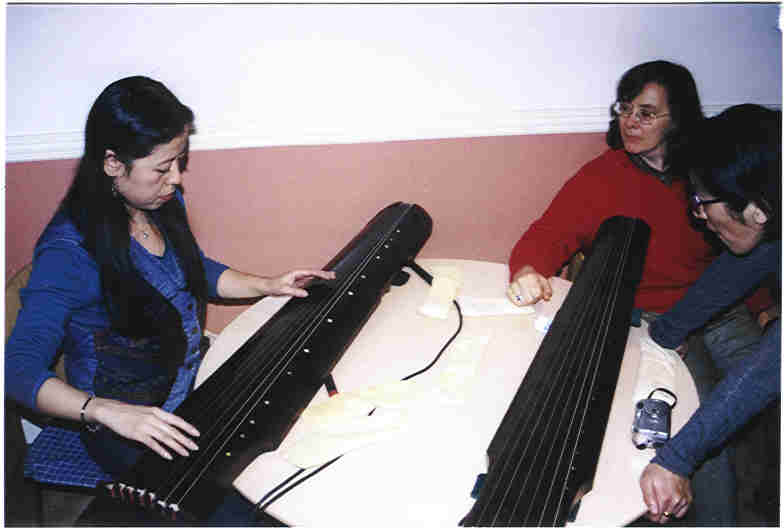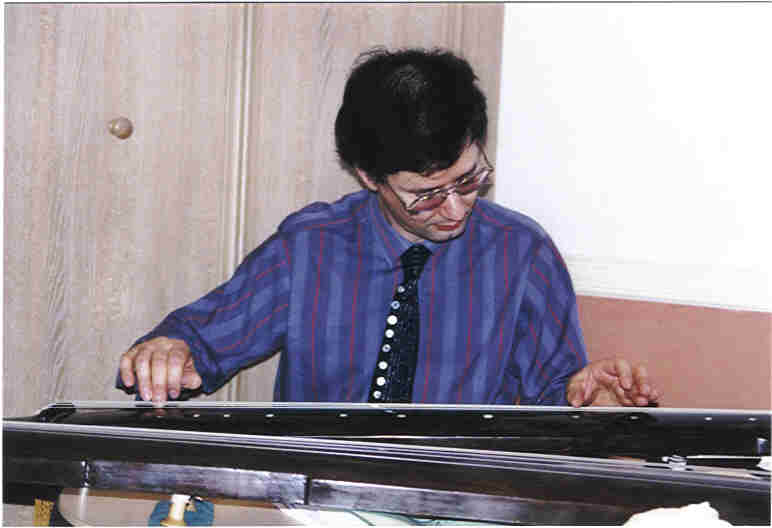
Stephen Dydo had come to London from New York, bringing with him a guqin he had made himself earlier in the year. Julian Joseph brought one made by Pei Jinbao of Suzhou, also completed in 2002. Dan Ing made a very fine recording of all the pieces played.
In the future we hope to hold more
such events, and to expand the circle of guqin enthusiasts.
|
Cheng Yu (left), Sarah
Moyse and Kazumi Taguchi (far right) discuss guqin music
|
 |
 |
Julian Joseph:
Guangling San Xin Pu (Guangling San - New Score) This is a variation of the much better known Guangling San played by Marnix Wells (see below). It comes from the Shiyi Xian Guan Qin Handbook (1907), which gives an interpretation which is essentially that of Han Gao, son of the Tang Dynasty painter Han Huang. Ji Kang, one of the "Seven Sages of the Bamboo Grove" (a group of literati who used to engage in music, poetry and wine drinking in a bamboo retreat in the mountains) is stated to have composed the piece. Around the end of the San Guo (Three Kingdoms) period (220-280 AD), the Sima clan seized power from the short-lived Wei dynasty (220-265 AD) and established the Jin dynasty (265-316 AD). Ji Kang lived during this period of transition. A number of military officers in Yangzhou, in the district of Guangling, hatched a plot to restore the Wei to power. They were put to death, thus shattering the Wei’s hopes for reinstatement. Hence Guangling. San means to scatter or break up, as well as being a musical term. |
|
Cheng Yu:
Guanshan Yue (Moon over the Mountain Pass) The earliest score was in the Longyin Guan Qin Handbook (1799). It became popular after its publication in the Mei’an Qin Handbook in 1931. The title, however, is much older, and appears for example as the name of a Han Dynasty song as well as a number of later songs and poems of the Yuefu style. It describes the feelings of conscripts going to fight in the border regions in Northern China, many of whom would never return. Jiu Kuang (The Drunkard)
|
| Tan Chinwee:
Xiao Xiang Shui Yun (Clouds over the Xiao and Xiang Rivers) First published in Shenqi Mipu, which attributes it to famous qin master Guo Chuwang of the Southern Song Dynasty (1127-1279AD). The Mongols had driven the Song rulers south, and they set up a new court in Wuling (present day Hangzhou). At the confluence of the Xiao and Xiang rivers, mist rises and the water seems to merge with the air above. In the distance the mountains are partially obscured. The music vividly contrasts this ethereal beauty with the composer’s anguish at the destruction wrought to his homeland by the invaders. |
|
Marnix Wells:
Guangling San (Guangling San) This piece has a history of at least 2000 years and is considered one of the most important pieces in the qin repertoire. According to the 2nd century book Qin Cao (Qin Music Collection), it is based on a story from the Warring States Period (475-221BC). The Han king had a sword maker executed for failing to deliver on time a sword he had commissioned him to make. The sword maker’s son Nie Zheng made up his mind to avenge his father's death. He went into the mountains for ten years, learned to play the qin and became a famous player, giving performances all over the country. The king heard of him and asked him to perform in the palace. Nie Zheng thus realized his long-cherished wish to kill him. Fearing his family might be in danger if his identity were known, he afterwards mutilated his face beyond recognition and committed suicide. |
| Stephen Dydo:
Ping Sha Luo Yan (Wild Geese Descending on the Sandbank) This piece is more than 300 years old and is one of the most frequently performed of all qin pieces. In the early qin handbooks there are scores for more versions of this piece than any other. As the title suggests, the music depicts wild geese ascending and descending on a bright sunny day. Like most qin music, however, it can be interpreted on more than one level: the cry of the wild goose is a symbol of separation and loneliness. Pu'an Zhou (Incantation
of Pu'an)
|
Attendees
Cheng Yu
Stephen Dydo
Dan Ing
Julian Joseph
Sarah Moyse
Kazumi Taguchi
Tan Chin Wee and family
Marnix Wells
Copyright Cheng Yu, J. Joseph, June 1998, March 2003. All rights reserved.